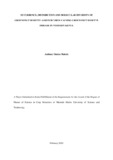| dc.description.abstract | Groundnut (Arachis hypogaea Linn) is an important legume in western Kenya, but yields are low and declining. Pests and diseases are ranked high among the yield reducing factors. Groundnut rosette disease (GRD) is the main disease and can cause up to 100% yield loss. Rosette is transmitted mainly by the groundnut aphid, Aphis craccivora Koch and to a lesser extent by Aphis gosypii Glover and Myzus persicae Sulzer. Rosette is caused by two synergistic viruses; groundnut rosette assistor virus (GRAV, genus Luteovirus) and groundnut rosette virus (GRV, genus Umbravirus) associated with a satellite-ribonucleic acid (sat-RNA). Inadequate current information on the occurrence, distribution and diversity of GRAV causing GRD in western Kenya, is a limiting factor on proper diagnosis and management of GRD which gave the impetus for this study. This study determined the occurrence, distribution and diversity of GRAV on groundnuts in western Kenya. A survey of GRD was conducted in Bungoma and Kakamega Counties during the short rains (October – December 2016) and long rains (May – June 2017). Symptomatic leafy samples were collected in falcon tubes containing RNALater solution, and preserved for laboratory analysis. The data collected on incidence and severity was subjected to analysis of variance and pairwise comparison of means done using Least Significance Difference at P ≤ 0.05. Screening for resistance to GRAV was done on five popular legume varieties and one solanaceous Physalis peruviana Linn. The plants at three leaf-stage were mechanically inoculated with GRD inoculum prepared from leaves of RT-PCR positive samples. The plants were monitored for symptom development in the screenhouse for 8 weeks. Total RNA was extracted from the leaf samples using RNeasy Mini Kit (Qiagen) according to the manufacturers’ protocol. The extracted total RNA was used for double stranded cDNA synthesis using the SuperScript II kit. DNA libraries were prepared and sequenced on the MiSeq platform (Illumina). Quality check on reads was done using FastQC. Trimmed reads were used for de novo assembly and contigs aligned to the viral genomes database using CLC Genomics Workbench 10.1.2. The assembled contigs were subjected to a BLASTn search against the GenBank database. Phylogenetic analyses and comparisons were performed using the MEGA X software. Primers used in RT-PCR were designed using Primer3Plus software from consensus sequences. A total of 144 farms were surveyed. Rosette was observed in all the surveyed areas with chlorotic symptoms being dominant followed by green rosette and mosaic. Mean rosette incidence was higher in Bungoma (66.51%) than Kakamega (60.52%). Short rains had higher mean incidence than the long rains season. Nucleotide sequences of GRAV coat protein (CP) gene revealed 97-99% identity among the western Kenya isolates and those from Ghana, Malawi and Nigeria. All tested plants developed viral symptoms and tested positive for GRAV by RT-PCR. The fact that GRD occurs wherever groundnuts are grown in western Kenya, is of great concern and may be the reason for the observed low yields. Incorporation of GRD resistant genes in the local cultivars/varieties may be the only practical solution. | en_US |

